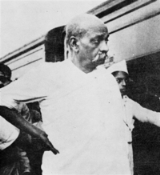
Sardar Vallabhbhai Patel
Overview
Barrister
A barrister is a member of one of the two classes of lawyer found in many common law jurisdictions with split legal professions. Barristers specialise in courtroom advocacy, drafting legal pleadings and giving expert legal opinions...
and statesman, one of the leaders of the Indian National Congress
Indian National Congress
The Indian National Congress is one of the two major political parties in India, the other being the Bharatiya Janata Party. It is the largest and one of the oldest democratic political parties in the world. The party's modern liberal platform is largely considered center-left in the Indian...
and one of the founding fathers of India. He is known to be a social leader of India who played a major role in the country's struggle for independence
Indian independence movement
The term Indian independence movement encompasses a wide area of political organisations, philosophies, and movements which had the common aim of ending first British East India Company rule, and then British imperial authority, in parts of South Asia...
and guided its integration
Political integration of India
At the time of Indian independence, India was divided into two sets of territories, the first being the territories of "British India", which were under the direct control of the India Office in London and the Governor-General of India, and the second being the "Princely states", the territories...
into a united, independent nation.Therefore he is also regarded as "Bismark of India". He was known as the "Iron Man of India".
Quotations
Patel's speech at Bahaddin College, Junagadh:"If Hyderabad does not see the writing on the wall, it goes the way Junagadh has gone. Pakistan attempted to set off Kashmir against Junagadh. When we raised the question of settlement in a democratic way, they (Pakistan) at once told us that they would consider it if we applied that policy to Kashmir. Our reply was that we would agree to Kashmir if they agreed to Hyderabad."R. Gandhi, Patel: A Life, pp. 438
![]()

